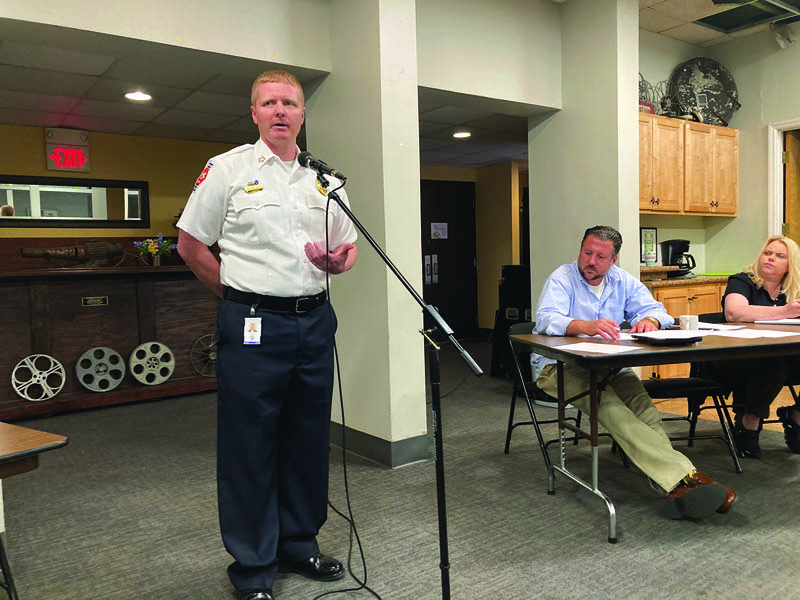Ideas for use of opioid settlements discussed

1 (photo:@@IK5nD )
A committee of three commissioners, led by Shelly Vandagriff but also including Joshua Anderson and Tim Isbel, has been looking at different ways to spend the funds, meeting with nonprofits and governmental agencies.
Previously, the county had $650,000 to spend, but more and more settlements continue to come in.
The commission in February added $207,216 from a settlement with Walmart, Walgreens, CVS, Allergan, and Teva. At its June meeting the commission accepted yet another settlement, this one for $7,068 over 11 years. It may also get a maximum $77,748 over 11 years from a separate opioid abatement fund related to the same Kroger settlement, Anderson County Mayor Terry Frank has told The Courier News.
Vandagriff said that some of these funds can go only toward abatement efforts, specifically measures provided by the Sheriff’s Office or Anderson County Emergency Medical Services. She said the county had already given EMS some of these funds for an ambulance station in Claxton.
Other funds she said, had to go toward long-term remediation, such as rehabilitation efforts and other assistance, including possible work with nonprofits.
Vandagriff said she planned to ask the nonprofits to submit plans, but her committee had not yet decided on the details of the process.
The committee held a meeting at High Places Community Church in Oak Ridge June 13.
People representing nonprofits such as United Way, Allies for Substance Abuse, and Trinity Outreach Center for Hope joined people from First United Methodist Church of Oak Ridge, High Places Community Church and two governmental agencies: EMS and the Oak Ridge Fire Department.
“It’s such an important topic,” said High Places Pastor David Allred.
“It touches us. I lost a church member Tuesday morning to lifelong substance abuse. And so we’ve all been touched by it some way. And this is just important that we’re together seeing each other, making eye contact, listening to our hearts and most importantly seeing where our brains can be put to good use and these resources can be put to good use.”
The organizations present focused on ways in which they could collaborate to solve the opioid crisis by using some of the funds.
Many spoke of working with each other, including Shayla Wilson, executive director of Allies for Substance Abuse Prevention of Anderson County. She spoke about the need to help entire families who might have a member suffering from addiction with multiple issues in their lives which she called “wraparound support.”
“There’s not one fix,” she said. “There’s not one answer. It’s truly our community coming together.”
Another idea discussed at the meeting was “leave behind kits,” which are supplies and resources people could receive after getting overdose help.
The grant can help nonprofits’ initiatives, and at the Oak Ridge meeting, as at an earlier meeting in Clinton, nonprofits were eager to share ideas.
This time, however, people from EMS and ORFD also shared their experiences and ideas.
EMS Director Nathan Sweet spoke of an idea he called “community paramedicine.”
He said paramedics can help after the EMS people respond to a 911 call.
The ambulance paramedics can provide Narcan to help with overdoses, but after that, the community paramedic can connect the people involved to resources they can use, Sweet said.
He also said he wasn’t asking for funding yet, that he was still working on finalizing a clinical site and classes for the program.
He said he hoped to get people involved who had been paramedics for at least five years, operating in a 911 system with a license to practice as a paramedic, for the training.
“Community paramedicine is something I’ve been passionate about for the longest time,” Sweet said. “The state of Tennessee did not allow EMS to do this for a long time. They did pass rules that finally allow for something like this to happen.”
Charlie Elliott of the Oak Ridge Fire Department also spoke, not just as a first responder, but as a father who said his son had suffered from drug problems.
“I think we need parent education,” Elliott said. “I had no clue. I didn’t know who to contact, what to do, what to expect.”
He said ORFD could use the funds for an education program.
“The same thing you do with the inflatable firehouse, only this would be more along the drug aspect,” he said.

